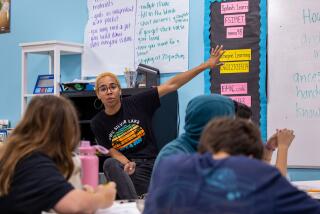A teacher’s first day
- Share via
‘Think Ivy League,” pleaded Mrs. Anderson, my English teacher. “Ivy League? What is that?” I remember thinking.
I was in the seventh grade that day, a student at Mount Vernon Middle School in mid-city Los Angeles. I stood there in awkward disbelief as Joan Anderson explained the notion of elite colleges to me. I knew hardly anything about colleges: Neither of my parents finished high school. But my teacher understood that, and by the time I graduated from Mount Vernon, she had made certain that I was committed to going to college.
Wednesday was my first day back at Mount Vernon, which is now Johnnie L. Cochran Jr. Middle School. I am a seventh-grade English teacher, placed here by Teach for America.
As I walked to my classroom on my first morning, I couldn’t help but think about how nervous and awkward I felt as a seventh-grader on the first day of school, and how even more nervous and more awkward I felt now.
The school stands just as I remember it. Every time I walk down the hallways, I stumble over yet another lost middle school memory. Some I buried for a reason. But other things, like the mural painted by my friend’s father that still covers the wall next to my classroom, make me smile and feel completely at home. I can’t help but see myself, and so many of my friends, in the 12- and 13-year-olds around me.
Students entering my classroom grabbed slips of paper that directed them to their assigned seats. All of my students sit in groups of four, each group named after a role model. Hanging from the ceiling, above each set of desks, is a picture of the role model and, on the back, a quote. Nobel Peace Prize laureate Rigoberta Menchu: “This world is not going to change unless we are willing to change ourselves.” Writer Langston Hughes: “Let all others keep silent a moment. I have this word to bring.”
I chose these figures because, at one point or another, I had looked to each to stay focused and empowered on my own educational journey. We didn’t discuss them very much on day one, but we will in the future as we read excerpts from their writings. All my students know so far is that these “legends” -- as a young man in my third period put it -- excelled by doing three things that we’re going to be working on every day, all semester: reading, writing and critical thinking.
Every teacher I’ve talked to emphasizes the importance of classroom management, so I made my expectations on behavior and academic performance -- and the consequences of not meeting them -- very clear that first day too. But before we got into that, I asked my new students two questions: What is something you have in common with everyone else in this classroom, and what is one thing that makes you unique? We discussed the importance of finding strength in our differences and similarities as a class. We talked about classroom values: Respect. Honesty. Pride. Community. Responsibility.
Values that have brought me back to my middle school.
To prepare for the next two years, I participated in the Teach for America Summer Institute, a six-week intensive training program. Then I spent three weeks in professional development classes and seminars at Cochran.
But before my first day, I knew I also had to visit Mrs. Anderson, who retired from Cochran several years ago.
A couple of weeks ago, we spent an entire Monday afternoon together. She’d been surprised, but happy, when I told her of my decision to join Teach for America. We talked for hours -- about her classroom management techniques, literacy strategies, pedagogical principles.
As I sat there listening to the woman who looked at me at age 12 and saw more in me than anyone ever had -- the woman who taught me to cast off self-doubt, to define for myself what I am capable and not capable of doing, to think critically and fight for what I believe in -- I could only hope that, one day, I could be a Mrs. Anderson for my students.






